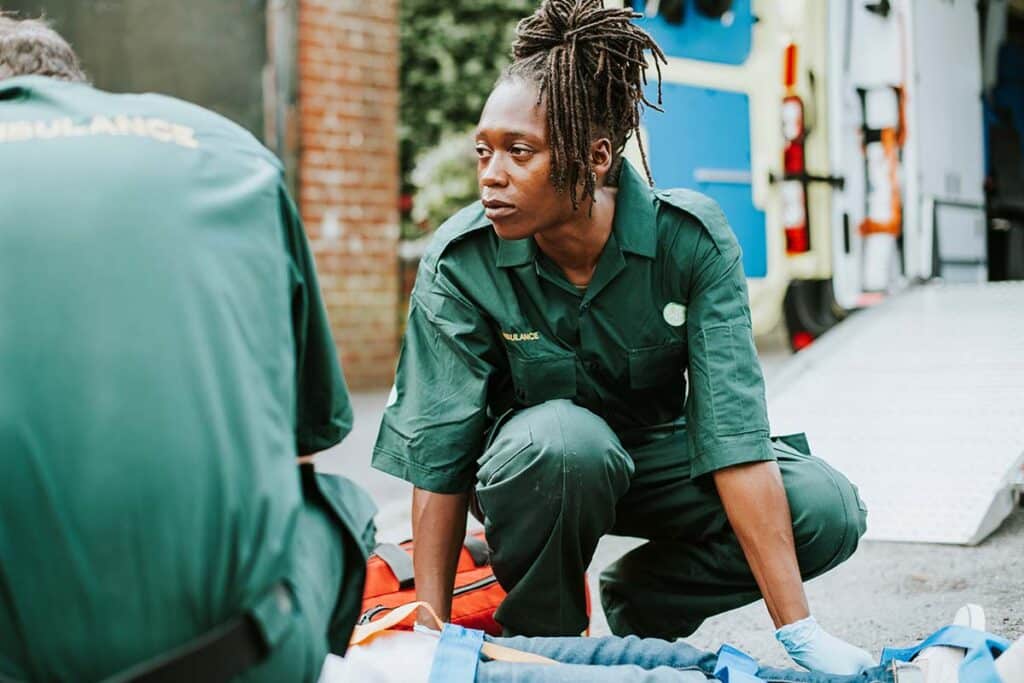Americans today often find themselves in various emergency or crisis situations. These can range from medical emergencies to natural disasters to fires or crimes. The professionals and volunteers who respond to these emergencies are called “first responders.” They are especially prone to addiction and mental health disorders.
Encountering and managing traumatic situations is part of the job description for first responders, but that does not mean they are immune to the horrific and traumatic events they are addressing. For many, addiction treatment for first responders in Massachusetts will be necessary.
If you are a first responder or know someone who is, and need help for substance use or mental health disorders, reach out to Swift River at 413.570.9698 for more information about our first responders addiction treatment program.
What Are Some Common Types of First Responders?
- Military personnel
- Police officers
- Firefighters
- Paramedics
- Mental health workers
- Emergency dispatchers
- Emergency room personnel
Some first responders are naturally associated with serious, traumatic events – military personnel are engaged in warfare, paramedics are the first on the scene of horrific car accidents, and emergency room technicians have to scan or x-ray horribly injured adults and children rushed to the ER.
However, police and firefighters often deal with the loss of life or loss of property by catastrophic means, and frontline workers like emergency dispatchers and mental health professionals are often dealing with distraught individuals shattered by traumatic events. This exposure to such extreme violence, loss, injury, death, and despair happens repeatedly, often multiple times in a day. It is impossible not to be affected by these stressful situations.
First Responders Are at Increased Risk of Developing Behavioral Health Issues
First responders are at risk of developing numerous medical and mental health issues due to the intensive nature of their work and the types of trauma and stress they witness. They are also at an increased risk of developing a substance use disorder. The constant exposure to extreme amounts of stress can result in the development of a trauma- and stressor-related disorder. For example, a police officer that develops a dependency on alcohol or sleeping pills to fall asleep at night.
Substance use and mental health disorders often go hand-in-hand and must be treated professionally by a first responders addiction treatment center like that offered by Swift River. First responders may develop post-traumatic stress disorder (PTSD) even if they are not personally threatened because individuals who witness the effects of severely traumatic situations are at an increased risk of developing this disorder. Individuals who develop trauma- and stressor-related disorders, particularly PTSD, are at a significantly increased risk of developing substance use disorders and other mental health conditions like depression and require addiction treatment for first responders in Massachusetts.
Warning Signs that Addiction Treatment for First Responders in Massachusetts Is Necessary
First responder professions are usually performance-driven and demand high levels of responsibility, accountability, and self-confidence. It is often difficult for individuals in these professions to admit they need help.
Here are some warning signs that a first responder treatment program might be needed:
- Trouble sleeping is often an initial sign of stress in individuals who are first responders. Individuals who begin sleeping significantly less (e.g., five hours a night or less when the person usually slept seven or more hours a night) may be displaying early signs of stress or even PTSD.
- When an individual begins viewing their use of alcohol as something they need to do, this can represent a serious sign that the person may be experiencing stress and an alcohol abuse issue.
- Excuses for excessive drinking. When people rationalize repetitive binge drinking, such as reporting that alcohol helps them to relax, feel better, unwind, etc., it can be a sign that the person is developing a substance use disorder.
- Problems with isolation, disengagement in relationships, and even expressions of frustration may indicate that the person is beginning to experience stress-related issues.
Personality changes, such as uncharacteristic anger, can be a sign that the individual is experiencing increased levels of stress.
Reach Out to Swift River Today
The incredibly important work of being a first responder should not be diminished because you or a loved one are too scared or proud to reach out for help. At Swift River, we offer discrete, professional addiction treatment for first responders in Massachusetts. Call today at 413.570.9698 or reach out to us online to get started.













